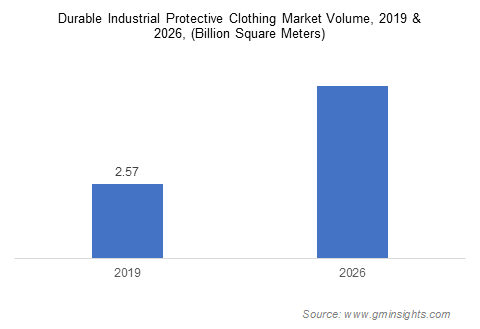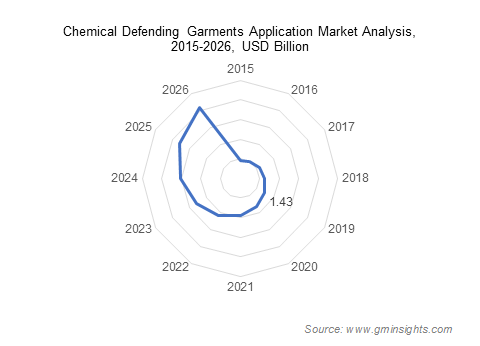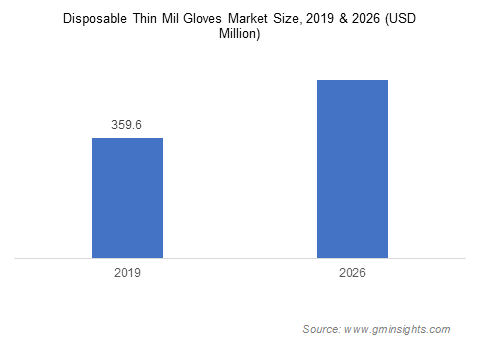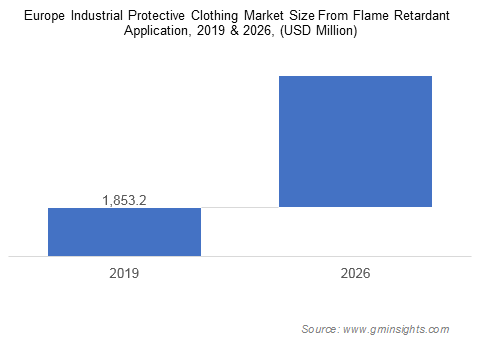Get a free sample of Industrial Protective Clothing Market
Thank you!
Your inquiry has been received. Our team will reach out to you with the required details via email. To ensure that you don't miss their response, kindly remember to check your spam folder as well!
Form submitted successfully!
Error submitting form. Please try again.
Get a free sample of Industrial Protective Clothing Market
Thank you!
Your inquiry has been received. Our team will reach out to you with the required details via email. To ensure that you don't miss their response, kindly remember to check your spam folder as well!
Form submitted successfully!
Error submitting form. Please try again.
Industrial Protective Clothing Market Analysis

The global market is bifurcated on the basis of products as durable and disposable products. Durable segment surpassed over 2.5 million square meters in 2019 which shows lucrative growth opportunities.
Durable clothing offers high economic feasibility in the long run and offers superior protection as compared to disposable clothing and It plays a vital role in the extreme environments characterized by weather condition and high protection. In addition, the National Institute for Occupational Safety and Health (NIOSH) is providing protective clothing which helps against various occupational hazards & injuries and is mainly used for construction and oil & gas industry to reduce work place fatalities, thus stimulating the industrial protective clothing market.
Durable chemical protective clothing prevents the worker from coming in contact to adverse elements of their working environment providing protection or reducing the risk of exposure. These products significantly reduce the risk of respiratory illness caused by smoke, gases, chemicals and contaminated air which are the key driving factors for the market growth.
In addition, the multi-functional clothing protects worker’s body from extreme temperature fluctuations which is further expected to accelerate industrial protective clothing market trends in the forecasted timespan.

On the basis of application, the market is further bifurcated into flame retardant apparel, clean room clothing, limited general use clothing, mechanical protective clothing, chemical defending garments and other applications. Chemical protective clothing provides resistance against a wide range of hazardous chemicals. The industrial protective clothing provides high protection and a balance of breathability & comfort so as to make chemical resistant apparels reliable which are the key driving factors for industrial protective clothing industry.
Chemical industry requires high performance clothing to provide protection to those working with several hazardous chemicals such as cleaning chemicals, paints and degreasers. Several industrial sectors utilize hazardous chemicals and gases against which superior body & health protection is required.
These products ensure protection against heat & flame and help provide high quality safety to the workers which are the key attributes driving the industrial protective clothing market demand globally.
Rising popularity of light-weight and high wear resistance materials has enabled manufacturers to invest in R&D and improve product quality. Ongoing trend for multi-functional durable clothing for workplace owing to stringent labor laws in the U.S. and Europe has further urged manufacturers to provide protective clothing which contribute to minimum hazards in the workplace, thus escalating the industrial protective clothing market expansion.

On the basis of disposable gloves, the market is segmented as disposable thin mill gloves, cut gloves, general purpose and chemical gloves. These products significantly help in preventing cross-contamination which can lead to various occupational skin disorders, thus stimulating the product demand.
In addition, these products offer high puncture resistance which further makes them suitable for use in oil & gas and chemical industries. Rising advancements in textile manufacturing, along with increasing availability of customized designs to cater to specific industry demands are further expected to foster the industrial protective clothing market growth.

Europe from flame retardant applications is expected to witness gains at over 15% by 2026. Growing awareness for safety and regulations have significantly urged the usage of protective clothing in various industries which has shifted inclination towards reliable clothing and is expected to drive the product demand from the region.
Protective clothing in flame retardant applications offer high protection to those that are at risk of exposure to fire hazards. These products significantly help minimize break-open, maintain a stable & inert barrier between the skin and fire, thus providing high protection to the worker from its direct exposure.
Increasing number of manufacturing hubs in the region including construction, automotive and oil & gas has further increased concerns towards worker’s health & safety, thus indicating a favorable scenario for industrial protective clothing market.
How much valuation will the industrial protective clothing industry register in the year 2026?
In 2026, the industrial protective clothing industry is estimated to record a valuation of 22.5 Billion (USD).
What is the expected growth rate for industrial protective clothing industry share through 2026?
Overall industrial protective clothin market would exhibit a crcr of 16% through 2026.
What will be the worth of global industrial protective clothing market by the end of 2026?
According to the report published by Global Market Insights Inc., the industrial protective clothing business is supposed to attain $22.5 billion (USD) by 2026.
Which application segment is expected to drive the market during the forecast period?
Based on the application, the mechanical protective clothing segment registered a significant market share in 2019 and is projected to record a remarkable growth rate throughout the forecast period.
Which are the top companies in the industrial protective clothing industry?
W.L. Gore & Associates, Honeywell International, Lakeland Industries, PBI Performance Products, Kimberly-Clark Corporation, Bennett Safetywear Ltd., Ansell Limited, Teijin Ltd, Australian Defence Apparel, VF Imagewear, DuPont, Royal Ten Cate NV are some of the top contributors in the industry.
What are the key factors driving the market?
Stringent regulatory norms, rise in workplace safety concerns, favourable certifications ensuring high product quality and reducing risk of product duplication, and intensifying product usage across various industries are the key factors expected to drive the growth of global market.